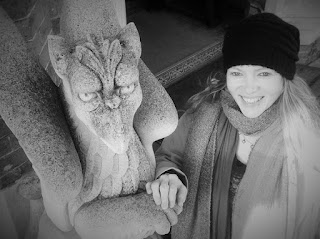Ruth Eastham is an award-winning author from Lancashire, who has lived in New Zealand, Australia and Italy. Her debut novel, The Memory Cage, was nominated for the Carnegie Medal. Her second book, The Messenger Bird, a story based on the Enigma Code with both a contemporary and World War II setting, is a featured book at Bletchley Park. Arrowhead is a thriller steeped in Norse mythology. The Jaguar Trials is her fourth book.
What was your favourite children’s book as a child?
The Magician’s Nephew by C.S. LewisWhat is your favourite children’s book as an adult?
Revolver by Marcus SedgewickWhat do you think makes children’s books so inspirational?
They go to the heart of a child’s world and show what young people are capable of.Why did you start writing for children?
In 2001 I entered a BBC competition looking for a new children’s story. I was lucky enough to be one of the six finalists and meet a great group of fellow writers.
What is your favourite aspect of writing for children?
The chance to write a story I believe in. Creating stories with heart.
El Dorado is such a great subject but what was it that compelled you to write about it?
For me, the mention of El Dorado immediately conjures up images of mystery and intrigue and danger – great ingredients for a story! I wanted to come up with a new angle on the age-old legends though, and also look at how the early exploration and exploitation impacted on South America cultures; the darker side of the quest to reach this fabled city.
Creating such a rich and vivid story can be difficult, how much research did you do for The Jaguar Trials?
One really inspiring piece of research was going to an exhibition of South American gold artefacts at the British Museum. The artefacts were breathtaking, particularly those that blurred the boundaries between humans and animals.
You might also notice a certain Colonel Percy Fawcett is in the acknowledgements for The Jaguar Trials. By all accounts he was quite a character; his mysterious disappearance in 1925 generated huge public interest. I visited the National Geographical Society in London to pore over early explorer maps and read Fawcett’s original diary accounts and letters.
His family motto has become my own personal writing motto: Difficulties Be Damned! J
You might also notice a certain Colonel Percy Fawcett is in the acknowledgements for The Jaguar Trials. By all accounts he was quite a character; his mysterious disappearance in 1925 generated huge public interest. I visited the National Geographical Society in London to pore over early explorer maps and read Fawcett’s original diary accounts and letters.
His family motto has become my own personal writing motto: Difficulties Be Damned! J




No comments:
Post a Comment
What do you think?